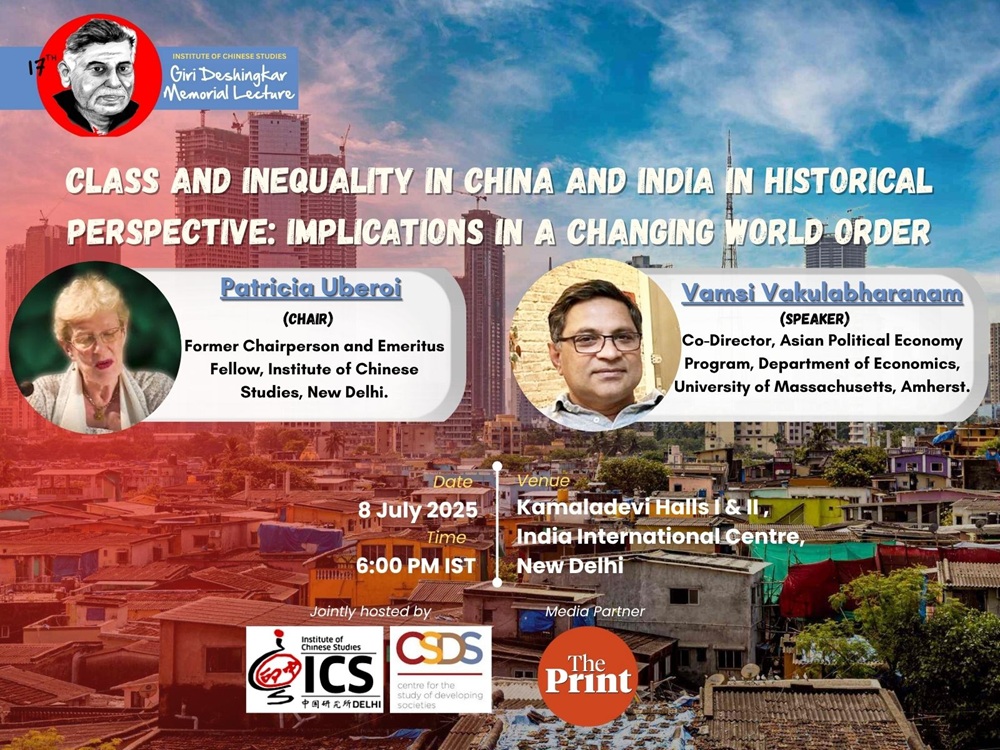Events > Giri Deshingkar Memorial Lecture

Abstract
China and India have witnessed a significant revival over the last three decades in terms of their place in the world economy. Two and a half centuries ago, they contributed 50 percent of the world output; after suffering a decline thereafter, their share fell to a paltry 9 percent in 1950 but has since resurged to over 25 percent today, in the process shaping the world order, while subsequently being shaped by it. Their growth and inequality experiences diverged for three decades following India's independence (1947) and the Chinese revolution (1949). Thereafter, there are remarkable underlying similarities in the experiences of both countries, especially in terms of their rising inequality patterns analysed through a class lens. The mutual interconnectedness between Chinese and Indian growth and inequality dynamics and the transformation and evolution of global capitalism is key to understanding the within-country inequality dynamics in both countries over the 1950-2010 period.
Speaker
Vamsi Vakulabharanam is Co-Director of the Asian Political Economy Program and Associate Professor of Economics at the University of Massachusetts, Amherst. He previously taught at the University of Hyderabad (2008-14) and the City University of New York (2004-07). His current research focuses on inequality in India and China and the political economy of Indian cities through the axes of gender, caste, class, and religion. In the past, he has also worked on agrarian change in developing economies, agrarian cooperatives, and the relationship between economic development and inequality. Vakulabharanam was awarded the Amartya Sen Award in 2013 by the Indian Council of Social Science Research. His latest publication is titled Class and Inequality in China and India, 1950-2010, published by the Oxford University Press in 2025.
Chair
Patricia Uberoi is an Emeritus Fellow at the Institute of Chinese Studies (ICS), Delhi. She served as the Chairperson of the Institute of Chinese Studies from 2015-2021. A sociologist by training, Uberoi has taught Sociology at the University of Delhi and the Jawaharlal Nehru University, New Delhi, and retired as Professor of Social Change and Development at the Institute of Economic Growth, Delhi. Her research interests centre on aspects of family, kinship, gender, popular culture and social policy in respect to both India and China. In addition to her monograph on themes of family, kinship and marriage through various genres of Indian popular culture (Freedom and Destiny: Gender, Family and Popular Culture in India, 2006), she has edited Family, Kinship and Marriage in India (1993), Social Reform, Sexuality and the State (1996), Tradition, Pluralism and Identity (co-ed., 1999), Anthropology in the East: Founders of Indian Sociology and Anthropology (co-ed., 2007), and Marriage, Migration and Gender (co-ed., 2008). Her most recent publication is the 4-volume Asian Families and Intimacies (co-ed. with Ochiai Emiko, 2021), a compendium of original translations from Asian languages, in which she had sourced and edited Part III, “Transforming Asian Sexualities”.
Lecture details and guidelines
This event is being jointly hosted by the Institute of Chinese Studies (ICS) and Centre for the Study of Developing Societies (CSDS), Delhi. The lecture will be preceded by tea at 6:00 PM IST in front of the hall.
 Report
Report
ICS-HYI MULTI-YEAR DOCTORAL FELLOWSHIP IN CHINA STUDIES: 2026
© 2019 ICS All rights reserved.
Powered by Matrix Nodes